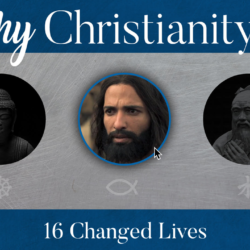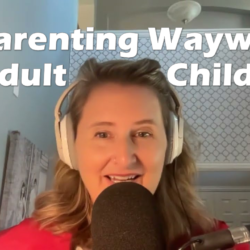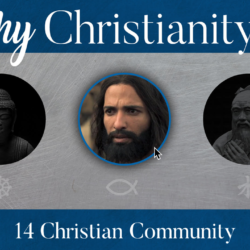In the last episode (Boundaries for Same-Sex Attraction), we looked at what the bible says about same-sex attraction. In this one, we consider seven important questions about gay and lesbian Christians:
- How should same-sex attracted Christians think of themselves?
- Isn’t the Christian sexual ethic harmful to gays and lesbians?
- Is having same-sex feelings a sin?
- Can someone go from gay to straight?
- Do people choose to be gay or are they born gay?
- As a Christian, how should I treat gay people?
- How can we support same-sex attracted folks who choose Christ over their sexual gratification?
Links:
- Becket Cook’s podcast, YouTube talk
- Sam Allberry’s book: Is God Anti-Gay?, website: LivingOut.org
- Rosaria Butterfield’s book: Secretly Thoughts of an Unlikely Convert
- Jackie Hill-Perry podcast
- Mark Yarhouse’s book: Homosexuality: The Use of Scientific Research in the Church’s Moral Debate
- Wesley Hill: Celibacy as a Call to Love (YouTube)
- Intro music: “District Four” by Kevin MacLeod. Licensed under Creative Commons: By Attribution 3.0 License.
Notes:
Becket Cook’s story can help us think through some really tough questions related to same-sex attraction.[1] Our culture pressures us through songs, movies, and stories about finding romance to believe singleness is inferior to relationships. It’s easy to get the impression that to achieve human flourishing and experience humanity to its fullest, you need to get married (or at least be in a serious relationship). What does that say about Jesus? Are we saying he wasn’t a full human being? Did Christ mope around, longing for romance? Did the great missionary Paul think singleness was a curse? Far from it, he wrote, “To the unmarried and the widows I say that it is good for them to remain single as I am” (1 Cor 7.8). He goes on to extol the benefits of celibate singleness, including freedom from worrying about how to please a spouse and freedom to serve the Lord better. He concludes, “So then he who marries his betrothed does well, and he who refrains from marriage will do even better…Yet in my judgment she is happier if she remains as she is [i.e. single]” (1 Cor 7:38, 40).
Question 1: How should same-sex attracted Christians think of themselves? Sam Allberry, author of Is God Anti-Gay, an excellent book, writes:
The gospel of Jesus is wonderful news for someone who experiences same-sex attraction. I used the term “same-sex attraction” just then because an immediate challenge is how I describe myself. In western culture today the obvious term for someone with homosexual feelings is “gay.” But in my experience this often refers to far more than someone’s sexual orientation. It has come to describe an identity and a lifestyle.
When someone says they’re gay, or for that matter, lesbian or bisexual, they normally mean that, as well as being attracted to someone of the same gender, their sexual preference is one of the fundamental ways in which they see themselves. And it’s for this reason that I tend to avoid using the term. It sounds clunky to describe myself as “someone who experiences same-sex attraction.” But describing myself like this is a way for me to recognize that the kind of sexual attractions I experience are not fundamental to my identity. They are part of what I feel but are not who I am in a fundamental sense. I am far more than my sexuality.
Take another kind of appetite. I love meat. A plate without a slab of animal on it just doesn’t feel right to me. But my love for meat does not mean I would want someone to think that ‘carnivore’ was the primary category through which to understand me. It is part of the picture, but does not get to the heart of who I am. So I prefer to talk in terms of being someone who experiences homosexual feelings, or same-sex attraction (SSA for short).”[2]
Whether same-sex attracted Christians calls themselves gay Christian or not is not my focus here. What’s important is that (1) they live chastely, and (2) their identity is in Christ not sexual orientation.
Question 2: Isn’t the Christian sexual ethic harmful to gays and lesbians? Sometimes people say that Christian sexuality is narrow-minded and stifling. They argue that it’s not healthy to deny who you really are or repress your identity. It can be psychological harmful to believe your defective or perverted. Here we see a hidden assumption. The Christian critic reduces human flourishing to sexual expression as if your sexual appetites define you. However, if you find your identity in Christ, all the rest pales in comparison whether selfishness (which you must repress), laziness (which you should fight), outbursts of anger (which you should tamp down), and a thousand other sinful impulses. If you’re part of the new humanity, created in Christ Jesus for good works, then you should strive to express outrageous cross-shaped love in anticipation of the coming kingdom. That’s who you are. You’re a kingdom citizen who happens to struggle with over-eating. You’re a Christ-follower who is tempted with pornography. You’re a child of God who experiences same-sex attraction. Sex is not the pinnacle of human experience, receiving God’s love and sharing it with others is.
The old script of Christian intolerance and rejection of same-sex attraction is far from universal. For example, Allberry explains his own experience of coming out to his church:
“It has also now been a few years since I shared about the issue of sexuality publicly with my church family. Again, it has been a great blessing to have done so. There has been a huge amount of support—people asking how they can help and encourage me in this issue, and many saying that they are praying for me daily. Others have said how much it means to them that I would share something like this. It has also been a great encouragement to me that it does not seem to have defined how others see me. Aside from the expressions of love and support, business was back to normal very quickly.”[3]
Question 3: Is having same-sex feelings a sin? Here we need to distinguish between a temptation and a sin. Attraction, whether to the same sex or opposite sex is something we have to manage. If you are married, you are not free to follow your sexual attraction wherever it leads you. Likewise, singe men and women need to take their sexual appetites captive to Christ (2 Cor 10:5). Finding someone attractive and fantasizing about him or her are two totally different situations: the former is the temptation, the latter is the sin.
Question 4: Can someone go from gay to straight? Sometimes sexual appetites change. “For nothing will be impossible with God” (Luke 1:37). Rosaria Champagne Butterfield, for example, initially lived as a lesbian for many years before becoming a Christian. Today she is married to a man. You can read about her journey in her book, The Secret Thoughts of an Unlikely Convert. Jackie Hill Perry thought of herself in very masculine terms and engaged in multiple relationships with girls. However, after she turned her life over to Christ, she changed and now she’s married to a man as well.[4] Although miracles may be preferable, sometimes therapy can also help. Mark Yarhouse has studied changes in same-sex attraction and found that some change along a spectrum is possible, but it is not universal and often not a full reversal of sexual orientation.[5] Thus, many just have to live with same-sex attraction. These people need our love and respect for their stand, not our badgering to get married or healed. Resources for gay Christians looking to remain single for Christ can be found at LivingOut.org.
Question 5: Do people choose to be gay or are they born gay? This is a debate I certainly cannot settle. Whether same-sex attraction is caused by nature or nurture is a moot point as far as how we treat people. Whatever the cause, if someone experience same-sex attraction, that’s where he or she is at now. So the pertinent question is not, “What went wrong?” so much as, “How do I follow Christ authentically now?”
Question 6: As a Christian, how should I treat gay people? Should I confront the issue right away? What if a gay couple comes to church? First of all, it’s a blessing anytime a couple starts coming. You might have an urge to set them straight with what the Bible says, but this is not a very helpful approach. By analogy, what would you do if a new couple comes and you find out they’re living together? Do you confront them immediately? Probably not. You know they need to hear the gospel first before they would even want to change. LGBTQ folks often enjoy tight-knit supportive communities. Do you think they’ll just give up everything because you tell them what the scriptures say on this issue? Sometimes people need to feel they belong before they are open to believe. If Christianity can provide a more compelling, more loving, more hospitable community than what they already have then they may consider Christ. Allberry says, “I would rather start at the center and work outwards, than start at the edge and work in.”[6] Only once living for God becomes more attractive to them than their current lifestyle will they consider changing.
Question 7: How can we support same-sex attracted folks who choose Christ over their sexual gratification? We need to honor singleness. Everything is not about marriage and parenting. The church can be a place to facilitate deep friendships.[7] Lastly, we can shut down homophobia when it rears its ugly head, including gay jokes, innuendos, disparaging remarks. As the church, Christ calls us to make disciples of everyone, not just straight people (Mat 28:19). May God forgive us where we’ve fallen short in this area and open our hearts to those hungering and thirsting for the living waters that only he can provide.
[1] Check out his testimony at BIOLA on YouTube. Search for “Becket Cook BIOLA” or go to this link: youtube.com/watch?v=qEgIHSOpqf4
[2] Sam Allberry, Is God Anti-Gay (Surrey, UK: The Good Book Company, 2015) pp. 10-11. I lean heavily on this book for answers to most of these questions. Naturally, his answers are more thorough than what I offer here.
[3] Allberry, p. 72.
[4] Watch her powerful testimony on YouTube, “My Life as a Stud.”
[5] See chapter 5 in Homosexuality: The Use of Scientific Research in the Church’s Moral Debate by Stanton Jones and Mark Yarhouse (Downers Grove, IL: InterVarstiy Press, 2000).
[6] Allberry, p. 67.
[7] Wesley Hill speaks about the importance of deep friendships and how he as a celibate gay Christian finds satisfying connections within the church. See his talk “Spiritual Friendship: Celibacy as a Call to Love” delivered at the Trinity School for Ministry (Whitchurch Publishing, February 15, 2015) on YouTube: youtube.com/watch?v=KybVFV7e-ss







I would like to know if you believe in laying on of hands and praying that God deliver all of us from our bondage?
Being gay or lesbian or whatever we call ourselves is a bondage, and Jesus came to set the captives free or those in bondage. I like your site because you prove the Trinity is incorrect and came from somewhere else other than the bible. And life after death, and burning forever and ever compared to destruction. I am an Annihilationist and came from burning for ever and ever. I believe we as Christians can receive power from on high not of ourselves but from above to be used just like they were in the Apostles days and after that. What do you think? This is in question to the gay and lesbian Christian. Thank you and be blessed
Sean, these past 4 Restitutio episodes have been most helpful for me, especially in regards to relationships with those who identify as LGBTQ. I’ve learned, in regards to all people, no matter their sin of choice, that it’s better to develop relationships based on loving our neighbor.. or enemy, before discussing biblical matters. Much damage has been done. A great example is Caleb Kaltenbach’s story, specifically the part where Christians were throwing things at him and his mom and calling them names because of his mom’s lifestyle. 1 Corinthians 5:10-13 comes to mind. I think the context of that passage is not to focus on the sin of those outside of the body of Christ. Not to judge outsiders. Certainly we can shine the light of Christ by living out or lives in a manner that’s worthy of being his ambassador, but to identify as a disciple or Christ and hurl insults and projectiles at our fellow man.. how will that lead someone into the Kingdom of God? Thanks again for these episodes
.
I have been involved with the ex gay Christian movement for almost 34 years. In my 73 years, I have never been sexually attracted to women. I had a gay brother who passed away from complications of HIV in 1995 at the age of 43. I also have 7 cousins (covering 4 generations) who are gay or lesbian.
In the course of my ex gay journey, I was involved first with Homosexual Anonymous. This was short lived, as I saw relationships form as there was no real accountability. After leaving the group I found out that the director (a single woman) became involved with another woman and came out as a lesbian. Then I joined an Exodus International affiliated ministry in Houston. I bought into the “sexual orientation” myth and sought to change my orientation. I went through all the programs such as Desert Streams Living Waters course. Living Waters concentrates on spiritual warfare, generational sins, banishing demons, and etc. However, I found this counter-productive for these reasons:
Jeremiah 31:29-30
29 “In those days they will not say again,
‘The fathers have eaten sour grapes,
And the children’s teeth are set on edge.’
30 “But everyone will die for his own iniquity; each man who eats the sour grapes, his teeth will be set on edge.
Ezekiel 18:1-4
Then the word of the Lord came to me saying, 2 “What do you mean by using this proverb concerning the land of Israel saying,
‘The fathers eat the sour grapes,
But the children’s teeth are set on edge’?
3 “As I live,” declares the Lord God , “you are surely not going to use this proverb in Israel anymore. 4 “Behold, all souls are Mine; the soul of the father as well as the soul of the son is Mine. The soul who sins will die.
James 1:14-16
But each one is tempted when he is carried away and enticed by his own lust. 15 Then when lust has conceived, it gives birth to sin; and when sin is accomplished, it brings forth death.
Why do I reject the concept of “sexual orientation”? This phrase was coined in 1967 by secular psychologists whose aim was to show that orientation is not chosen and to legitimize homosexuality as just one human behavior that should be accepted as normal. When the Bible speaks to sin and abomination God is addressing human behavior that is counter to His perfect design for mankind.
Leviticus 18:22 ‘You shall not lie with a male as one lies with a female; IT is an abomination.
Leviticus 18 also tells us that incest, adultery, bestiality, and other human behaviors are admiration (see vs 26-30) Here is another reason I reject “sexual orientation”:
1 Corinthians 6:9-10
9 Or do you not know that the unrighteous shall not inherit the kingdom of God? Do not be deceived; neither fornicators, nor idolaters, nor adulterers, nor effeminate, nor homosexuals, 10 nor thieves, nor the covetous, nor drunkards, nor revilers, nor swindlers, shall inherit the kingdom of God.
1 Timothy 1:8-11
8 But we know that the Law is good, if one uses it lawfully, 9 realizing the fact that law is not made for a righteous man, but for those who are lawless and rebellious, for the ungodly and sinners, for the unholy and profane, for those who kill their fathers or mothers, for murderers 10 and immoral men and homosexuals and kidnappers and liars and perjurers, and whatever else is contrary to sound teaching, 11 according to the glorious gospel of the blessed God, with which I have been entrusted.
Of all the behaviors listed in the above, why is it only homosexuals are to change their “sexual orientation” while all others repent of their behavior? The answer is the ex gay movement picked up on “sexual orientation” and based on the anecdotal evidence of those like Frank Worthen (the grandfather of the ex gay movement), Joe Dallas, Dennis Jernigan, and others claim they have changed their orientation when in fact what changed were mindsets and behavior.
I took the time to read: Homosexuality: The Use of Scientific Research in the Church’s Moral Debate. Jones and Yarhouse make an attempt to justify reparative therapy as effective in changing sexual orientation. However, even though these men frame orientation change as scientific, what NARTH and others base claims of success on the anecdotal opinions of those who participate in counseling. I do not deny that men and women can change their behavior, per the Biblical standard for human sexuality as well as Dr. Warren Throckmorton’s position on reparative therapy: http://www.patheos.com/blogs/warrenthrockmorton/reparative-therapy-information/
I know about, and support Sam Allberry’s Livingout.org. I find it interesting that this organization rejects conversion therapy as well as reparative therapy, which they do with a link to Russell D. Moore’s (who is president of the Ethics & Religious Liberty Commission of the Southern Baptist Convention) Youtube video rejecting this type of therapy: https://youtu.be/eNqtjglIuYM
Add to the above the fact that gays, lesbians, and bisexuals are in heterosexual marriages, such marriages are called mixed orientation marriages. Here is a link to a support group for these people: Making Mixed Orientation Marriages Work
You ask the question, As a Christian, how should I treat gay people? Jesus answered this question 2,000 years ago, “love your neighbor as yourself” and “do not judge”. Paul adds to this in 1 Corinthians 5:9-13, where vs. 12 – 13 reads: 12 For what have I to do with judging outsiders? Do you not judge those who are within the church? 13 But those who are outside, God judges. Jesus also said:
John 6:44 “No one can come to Me, unless the Father who sent Me draws him; and I will raise him up on the last day.
If a homosexual walks into your church, it is a good bet the Holy Spirit is already working in their lives and they already know the Scriptures used to show homosexuality is a sin. Just love them and obey Jesus.
I did not choose to have same-sex attractions, however, I did choose to live a celibate life in obedience to God’s truth as have more ex gays and lesbians than you think who have not outed themselves out of fear.